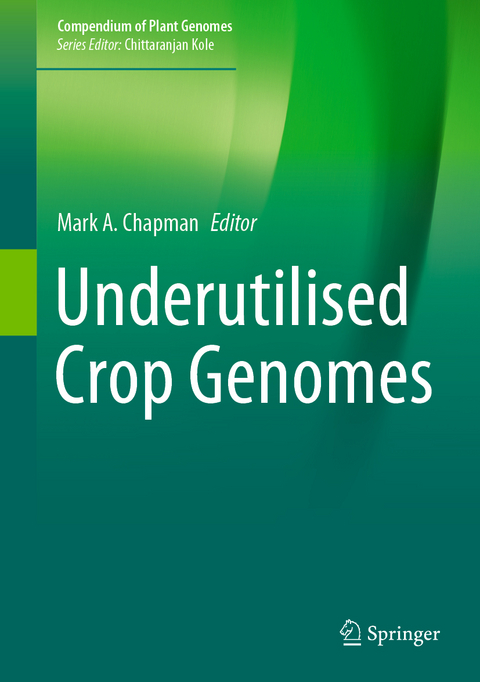
Underutilised Crop Genomes
Springer International Publishing (Verlag)
978-3-031-00847-4 (ISBN)
This book highlights the uses for underutilized crops, presenting the state-of-the-art in terms of genome sequencing for over 30 crops, previously understudied and under-researched. In a changing climate and with significant pressure on the land, it is the ideal time to be discussing novel crops, with significant biotic and abiotic tolerances and/or rich nutrient profiles for consumers. Previously, the only species with sequenced genomes were high-profile internationally recognized crops, but in the current era genomes are being sequenced for dozens of crops, including those previously classified as underutilized, now being investigated. This book covers food crops, from fruits to tubers, and from grasses to legumes, as well as crops with non-food applications. Some of these crops have draft genomes, and others have polished genomes with extensive resequencing panels. Each chapter tells the story of an individual crop or crop group, written by experts, focusing on thegenome data available, revealing more about crop domestication and genetic variation, and the current and future prospects given that this data is now becoming available. It also highlights how even small sequencing projects can provide draft genome sequences suitable for gene discovery, comparative genomics, and identification of molecular markers for understanding these crops further.
lt;p>Dr Mark Chapman is an Associate Professor in Ecology and Evolutionary Biology, and his research focuses on determining the genetic basis of adaptive phenotypes. He works with a range of plants (and some animals) and carries out detailed genetic and genomic investigations comparing populations or species. His research identifies the genes that are important for adaptation, speciation, and domestication; therefore, it is important for the fields of evolutionary biology, genomics, and mitigating climate change.
Chapter 1. The Broomcorn Millet Genome.- Chapter 2. Buckwheat Genome and Genomics.- Chapter 3. Tef [Eragrostistis tef (Zucc.) Trotter].- Chapter 4. The Apricot Genome.- Chapter 5. Chinese Jujube: Crop Background and Genome Sequencing.- Chapter 6. The Longan (Dimocarpus longan) Genome.- Chapter 7. The Mangosteen Genome.- Chapter 8. The Passion Fruit Genome.- Chapter 9. The Soursop Genome (Annona muricata L., Annonaceae).- Chapter 10. Underutilised Fruit Tree Genomes from Indonesia.- Chapter 11. The Bambara Groundnut Genome: From the Crop to the Genome.- Chapter 12. Grasspea.- Chapter 13. The Lablab Genome.- Chapter 14. The Perennial Horse Gram (Macrotyloma axillare) Genome, Phylogeny, and Selection Across the Fabaceae.- Chapter 15. Breeding and Genomics of Pigeonpea in the Post-NGS Era.- Chapter 16. Rice Bean.- Chapter 17. The Winged Bean Genome: One Species Supermarket.- Chapter 18. Castor Bean: Recent Progress in Understanding the Genome of this Underutilized Crop.- Chapter 19. Genome Resources for Ensete Ventricosum (enset) and Related Species.- Chapter 20. Yam Genomics.- Chapter 21. The African Eggplant.- Chapter 22. Sequencing of the Bottle Gourd Genomes Enhances Understanding of the Ancient Orphan Crop.- Chapter 23. Advances and Prospects in Genomic and Functional Studies of the Aquatic Crop, Sacred Lotus.- Chapter 24. Utilising Public Resources for Fundamental Work in Underutilised and Orphan Crops.
| Erscheinungsdatum | 05.11.2022 |
|---|---|
| Reihe/Serie | Compendium of Plant Genomes |
| Zusatzinfo | XXIV, 450 p. 125 illus., 105 illus. in color. |
| Verlagsort | Cham |
| Sprache | englisch |
| Maße | 178 x 254 mm |
| Gewicht | 1079 g |
| Themenwelt | Naturwissenschaften ► Biologie ► Botanik |
| Schlagworte | Adaptive and Novel Traits • Climate change resilience • genetic variation • Genome sequencing • Underutilised/Novel Crops |
| ISBN-10 | 3-031-00847-2 / 3031008472 |
| ISBN-13 | 978-3-031-00847-4 / 9783031008474 |
| Zustand | Neuware |
| Informationen gemäß Produktsicherheitsverordnung (GPSR) | |
| Haben Sie eine Frage zum Produkt? |
aus dem Bereich


